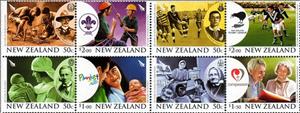Se-tenant: Centenaries se-tenant block (New Zealand 2007)
Centenaries se-tenant block (New Zealand 2007)
24 April (New Zealand ) within release Centenaries goes into circulation Se-tenant Centenaries se-tenant block face value 8.50 New Zealand dollar
| Se-tenant Centenaries se-tenant block in catalogues | |
|---|---|
| Michel: | Mi: NZ 2397-2404 |
| Unificato: | Un: NZ 2455-2462 |
Se-tenant is horizontal format.
Also in the issue Centenaries:
- Stamp - 100 Years of World Scouting. Lieut-Col David Cosgrove V.D. face value 50;
- Stamp - 100 Years of New Zealand Rugby League face value 2;
- Stamp - 100 Years of Plunket. Dr Frederick Truby King face value 50;
- Stamp - 100 Years of New Zealand Rugby League. Hercules 'Bumper' Wr face value 50;
- Stamp - 100 Years of Home of Compassion. Suzanne Aubert face value 50;
- Stamp - 100 Years of Plunket face value 1;
- Stamp - 100 Years of Home of Compassion face value 1.50;
- Stamp - 100 Years of World Scouting face value 2;
- Se-tenant - Centenaries se-tenant block face value 8.50;
Se-tenant Centenaries se-tenant block it reflects the thematic directions:
An anniversary is the date on which an event took place or an institution was founded in a previous year, and may also refer to the commemoration or celebration of that event. For example, the first event is the initial occurrence or, if planned, the inaugural of the event. One year later would be the first anniversary of that event. The word was first used for Catholic feasts to commemorate saints. Most countries celebrate national anniversaries, typically called national days. These could be the date of independence of the nation or the adoption of a new constitution or form of government. The important dates in a sitting monarch's reign may also be commemorated, an event often referred to as a "Jubilee".
Family (from Latin: familia) is a group of people related either by consanguinity (by recognized birth) or affinity (by marriage or other relationship). It forms the basis for social order. The purpose of the family is to maintain the well-being of its members and of society.[according to whom?] Ideally, families offer predictability, structure, and safety as members mature and learn to participate in the community. Historically, most human societies use family as the primary purpose of attachment, nurturance, and socialization
In common terminology, a baby is the very young offspring of adult human beings, while infant (from the Latin word infans, meaning 'baby' or 'child') is a formal or specialised synonym. The terms may also be used to refer to juveniles of other organisms. A newborn is, in colloquial use, a baby who is only hours, days, or weeks old; while in medical contexts, a newborn or neonate (from Latin, neonatus, newborn) is an infant in the first 28 days after birth (the term applies to premature, full term, and postmature infants).
A people is a plurality of persons considered as a whole, as is the case with an ethnic group or nation. Collectively, for example, the contemporary Frisians and Danes are two related Germanic peoples, while various Middle Eastern ethnic groups are often linguistically categorized as Semitic peoples.
Rugby union football, commonly known simply as rugby union in English-speaking countries and rugby 15/XV in non-Anglophone Europe, or often just rugby, is a close-contact team sport that originated at Rugby School in England in the first half of the 19th century. Rugby is based on running with the ball in hand. In its most common form, a game is played between two teams of 15 players each, using an oval-shaped ball on a rectangular field called a pitch. The field has H-shaped goalposts at both ends.
Scouting, also known as the Scout Movement, is a worldwide youth social movement employing the Scout method. It is a program of informal education with an emphasis on practical outdoor activities, including camping, woodcraft, aquatics, hiking, backpacking, and sports. Another widely recognized movement characteristic is the Scout uniform, by intent hiding all differences of social standing in a country and encouraging equality, with neckerchief and campaign hat or comparable headwear. Distinctive uniform insignia include the fleur-de-lis and the trefoil, as well as merit badges and other patches.






